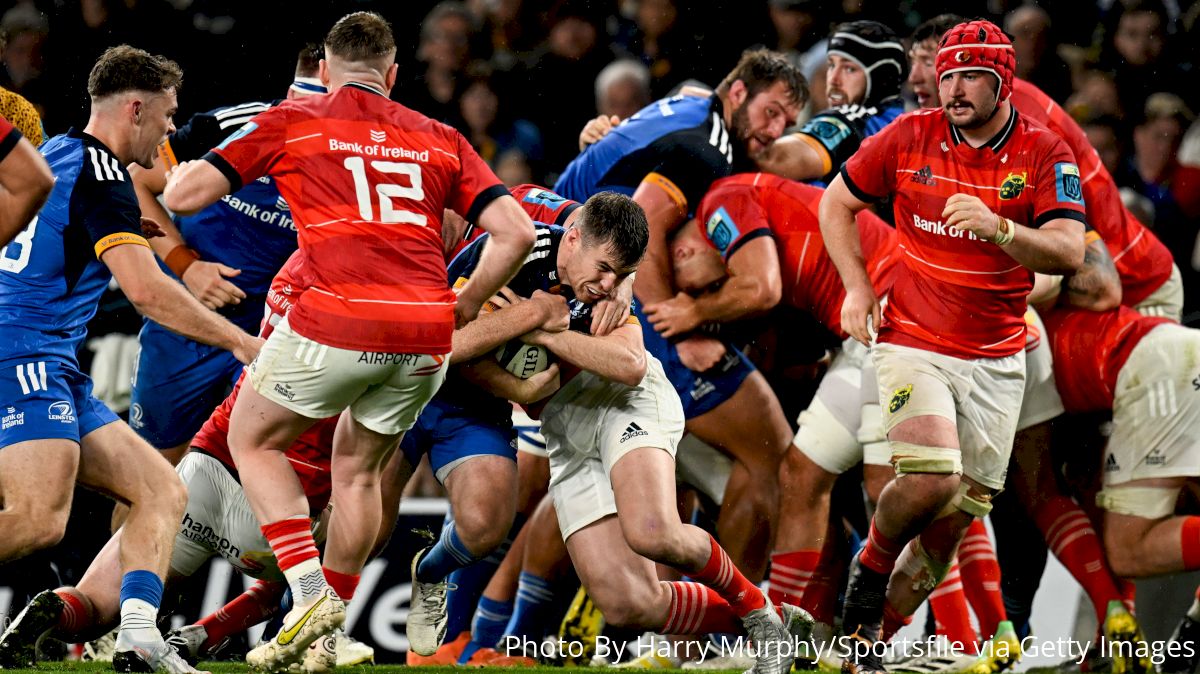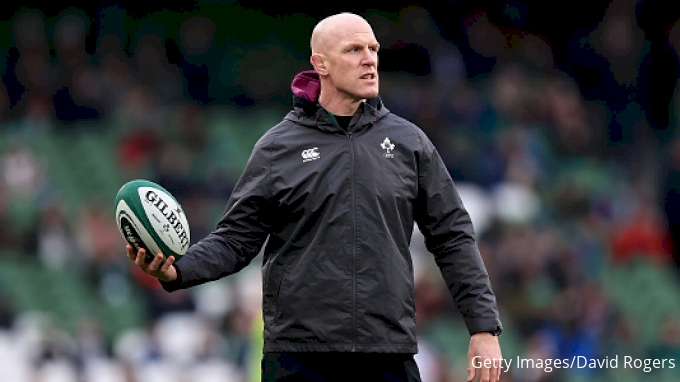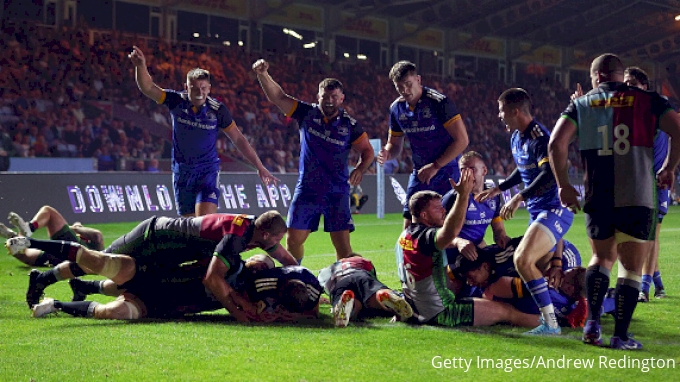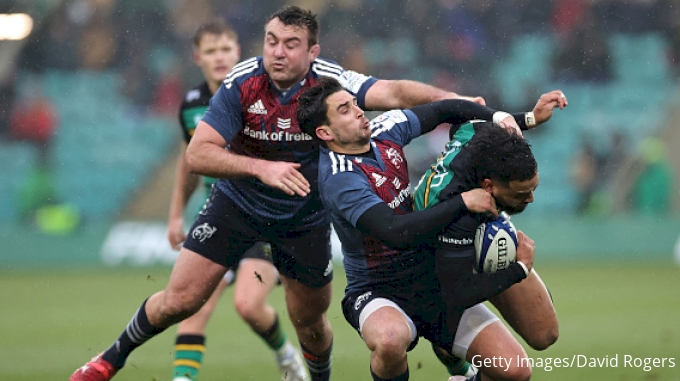Rivalry Renewed, As Locked-And-Loaded Munster Welcomes Leinster To Limerick
Rivalry Renewed, As Locked-And-Loaded Munster Welcomes Leinster To Limerick
Club Rugby’s biggest rivalry returns for one final clash in 2022, as Munster welcomes Leinster to Thomond Park, with major implications for the home side.

Club Rugby’s biggest rivalry returns for one final clash in 2022, as Munster welcomes Leinster to Thomond Park for a clash with major implications for the home side.
By any measurable metric, Munster against Leinster is rugby's leading light outside of test rugby, and it is a true example of why tribalism is the best form of marketing for any top-level sport.
Possessing six Heineken Champions Cup titles and 11 league cups between them, there is no doubting the pedigree of the two sides on show.
Take into account that the largest non-test rugby attendance in the sport's history was the 2009 Heineken Cup semifinal clash between the two sides, as 82,208 fans crammed into Croke Park, and the magnitude of the occasion really hits home.
In fact, 2009 is perhaps the perfect starting point from which to discuss this rivalry, as one dynasty petered out and the other was born.
Having taken like a duck to water as rugby transitioned from amateur to professional, Munster Rugby hit the ground running as a European superpower.
Munster reached its first quarterfinal in its fourth season in Europe, and the team's love affair with European rugby was born.
Built on a foundation not too different than the David and Goliath story, Munster’s mythical reputation as a nigh on unbeatable team at their fortress of Thomond Park became the topic of many a conversation in many a bar around Europe.
Combined with a never-say-die attitude at home, it was Munster’s aptitude for the big moments away in France and England that made it one of the most respected brands in the international game.

While the Munster mystique developed around the titanic figures of Paul O’Connell, Ronan O’Gara and Anthony Foley, Leinster Rugby looked on as the forgotten child of Irish Rugby.
Making a semifinal in its debut at the Heineken Cup during the 1995-1996 season, it would take the Dubliners until the 2001-2002 competition to once again make the knockout stages of Europe’s elite competition.
At this stage, Munster already had featured in four knockout stages, making the final twice.
As Munster Rugby then took the next step, winning the Heineken Cup in 2006 and 2008, Leinster remained nearly incapable of getting out of its own way.
That was, of course, until 2009, when the shoe was on the other foot, and David once again met Goliath. This time, however, it would be Munster taking on the role of Goliath, while their mates from the capital played the role of David.
Having seen their own fans switch allegiances, the term “Lunster” saw the Leinster fans give up hope, instead investing their support in the proven winners from down south.
It was no surprise that Leinster arrived in no mood for another slip up and ripped into the reigning Heineken Cup champions in a fashion unlike Munster had ever experienced.
As Irish legend Brian O’Driscoll intercepted his longtime international teammate O’Gara to all but seal the result, a changing of the guard was taking place before our very eyes.
"The 30-year-old saw he had 80m to go and took one final sigh" 😂🙌
— Rugby on BT Sport (@btsportrugby) April 30, 2020
Watch @BrianODriscoll commentate on two classic matches in full on the BT Sport website and app! 📲
➡️ Leinster vs Toulouse '06
➡️ Leinster vs Munster '09 pic.twitter.com/jCajfHprfu
To that point, Munster had dominated its immensely talented, but underperforming, neighbors.
A record of 20 wins from the previous 31 games, with two draws, highlights just how far ahead Munster was at that point.
Of course, Leinster would go on to win the Heineken Cup for the first time in that 2009 season, defeating English powerhouse, Leicester, in a tense final, 19-16.
With that title came a belief that saw Leinster emerge from the sizeable shadow cast by its Limerick-based brethren.
Looking directly at the head-to-head record of the two sides provides a snapshot of the two unions' fortunes.

Of the 34 clashes between the two sides since 2009, Leinster has won 26, including nine of the past 10, to paint a very sorry picture for those in red.
On a wider scale, Leinster has gone on to win the Heineken Champions Cup three more times, plus six league titles, to sit firmly atop the pile of elite European club rugby.
Munster, on the other hand, has won a single league title, way back in 2011, as the golden generation gave one final hurrah.
So, how exactly did we get to this point, and why does this evening’s fixture mean anything?
To start with, this fixture is very much a fork in the road game for Munster, which has picked about as a strong a side as possible.
Leinster has, of course, rotated its squad, but remains a formidable outfit, stacked to the gills with international talent ready to once again send the Thomond Park faithful home empty handed.
Despite the one-sided nature of the past decade, this clash still trends as the highest-viewed and most-followed club rugby rivalry in the world.
Since that 2009 clash, more than 1 million supporters have watched the two sides go head-to-head, meaning there has been an average 34,2111 fans at games, discounting the COVID-19 years.
These numbers are unparalleled. Quite frankly, they're the figures of dreams for the world’s other elite leagues, especially the struggling English Premiership.
From a macro viewpoint, this fixture is significant for both sides for very contrasting reasons.
📺 PRESS PASS | Hear from Munster Attack Coach Mike Prendergast & Antoine Frisch as they spoke to the media ahead of #MUNvLEI at Thomond Park tonight ⤵️#SUAF 🔴 pic.twitter.com/HP76Eow5sh
— Munster Rugby (@Munsterrugby) December 26, 2022
For Munster, there has been a changing of the guard that has begun in earnest this season.
Out, is the trudged style of Johan van Graan, who despite making a few semifinals in both Europe and the League, never quite got his side over the hump, and he struggled mightily to come to grips with Leinster.
In his place, comes Graham Rowntree, Mike Prendergast and Denis Leamy a coaching ticket that carries the feeling of an old-school Munster win-at-all-costs aura.
Both Prendergast and Leamy saw their playing days overlap with the great days of Munster Rugby, while Rowntree is cut from the similar cloth, having been involved with legendary Leicester Tigers teams that dominated the English and European games.
It is not just in the coaches’ box where the changes are coming.
On the field, the old guard of Peter O’Mahony, Conor Murray, Keith Earls and Dave Kilcoyne all are in their 30s and very much on the back nine of their careers.
This group of players carried the burden of being the guys after the main guys. Tasked with the impossible task of living up to the standards set by their predecessors, this group missed the mark, not through lack of effort, but rather a shift in the tide from Limerick to Dublin.
Earls, in particular, was the “bridge” player having played with the golden generation, in fact he is the only current player remaining from the 2008 Heineken Cup winning team.
Keith Earls try-saving tackle appreciation tweet. pic.twitter.com/LZCvr2JMz4
— Andrew Forde (@andrewfrugby) August 24, 2021
Now 35-years-old, Earls is a true reflection of the time that has passed between that group and this current group of senior players.
These players are joined by a new group of Munster players, spearheaded by a group of immensely talented youngsters in Jack Crowley, Gavin Coombes, Edwin Edogbo, Craig Casey and Antoine Frisch. There finally is a feeling of balance in the Munster squad.
📢 TEAM ANNOUNCEMENT | The Munster side has been named for Sunday’s #HeinekenChampionsCup clash away to Northampton Saints at Franklin’s Gardens (1pm).
— Munster Rugby (@Munsterrugby) December 16, 2022
Jack Crowley, Keith Earls, Conor Murray & Jack O’Donoghue come into the starting XV, see full team news ⤵️#NORvMUN #SUAF 🔴
These players enter unburdened by the glory days of the past and enter the fray with a freedom to drive Munster Rugby forward against Leinster players, with whom they have dominated at underage international level.
In fact, Crowley, who was born in 2000, the same year Munster agonizingly lost the Heineken Cup final to Northampton, looks set to be the next coming of the fly-half on that day, O’Gara.
While the stakes in a midseason league game are not on the magnitude of a Heineken Cup semifinal, the need for a win is as equally relevant for Munster as it was for Leinster back then.
Simply put, this new generation of players must become the one that stops the bleeding.
Winning at home is a prerequisite for success, no matter what level you play at, and Munster needs to make Thomond Park a fortress once again.
Focusing in on a more micro level, Crowley, who emerged from obscurity just 12 months ago to starting alongside fellow Irish international, Joey Carbery, in a play-making 10/12 axis faces off against the Byrne brothers.

Both Ross and the younger Harry have been, and will continue to be, in direct competition with Carbery and Crowley as the back-ups-cum-competitors for Jonathan Sexton’s starting place in the national team.
Carbery, in particular, long has been heralded as the successor in waiting, only to be cut down by injury time and again.
Ross, who has had a terrible run in the green jersey, has righted the ship as of late, having shown serious gumption to land the winning kick in Ireland’s recent victory over a ferocious Australian team. Despite this last-minute recall, Ross has been the unwanted man at international level, despite his immaculate performances for Leinster.
In fact, Andy Farrell clearly has seen more in Harry. He took him on the recent successful tour to New Zealand.
Harry, like Carbery, has found it nigh on impossible to remain on the field. He, too, has been battling injury after injury, but when on song, might be the most dangerous attacking threat Ireland possess at the fly-half position.
Finally, we have Crowley, who in the last 12 months, has gone from nothing more than a talented youngster looking to break into the Munster team, to the most likely long-term successor, for both the red and green No. 10 shirts.
Crowley seems to have that something about him. He's a dominant figure, who while not yet close to being the finished product, has that key quality trait of not allowing the moment faze him and not dwelling on mistakes
This is not to say the other three don’t have big play ability, but rather that Crowley has that dog in him that resembles both Sexton and O’Gara, with the physical traits to fulfil on this potential.
Therefore, his selection in the 12 shirt is a clear indication that the Munster coaching team believes it has two international-standard play-making options in Carbery and Crowley, and they are going to find a way to make two fit into one.
A second backline storyline is that of French born Antoine Frisch, whose emergence at Munster has made the summer’s marquee signing, makes Malaki Fekitoa an afterthought looking set to be cut loose.
Making his mark in Munster’s win over the SA’A side in November, Frisch has more potential than any Munster center, since Springboks legend Jean de Villiers. High praise indeed, but on early impressions, more than justified.
A Thomond Park debut for @AntoineFrischh on Saturday night & another strong outing in red 💪
— Munster Rugby (@Munsterrugby) November 29, 2022
Hear his post-match thoughts ⤵️#MUNvCON #SUAF 🔴 pic.twitter.com/vDAIsX5fpo
Facing him is the undoubted first-choice center for Ireland in Leinster captain Garry Ringrose, who almost certainly does not get the recognition he deserves.
Touted as the next Brian O’Driscoll, a premonition too big for any player, Ringrose has taken the Irish No. 13 role and turned it into his own.
While he is not as flashy as O’Driscoll, he does everything to a world-class level. His importance for both province and country is such that he is the cog that makes the attacking game work and the man, who more often than not, shuts down the opposition’s attack.
Therefore, the midfield battle will be a real indicator into just how good Frisch is and whether he could one day push Ringrose for the green No. 13 shirt.
In the forwards, Munster will look to not only get parity, but finally get the better of its Leinster counterparts.
This is no easy task, given the Leinster eight all are internationals at either senior or underage level, with a British & Irish test Lion in Jack Conan sitting on the bench.
Despite this, Munster will back itself with the dogged leadership of O’Mahony and Tadhg Beirne almost certainly being crucial to their hopes. Both men are masters at the line-out and in creating breakdown turnovers, two areas that will be fundamental in slowing down Leinster’s up-tempo game.
While the two senior internationals are the leaders of the pack, it is 25-year-old Coombes who has the potential amongst the young forwards to be the star man.
Scoring two tries last time out against Northampton, Coombes was the difference in Munster coming out with the much-needed victory. A giant in the No. 8 position, Coombes is close to unstoppable from close range, while being utterly dominant in defense.
😍😍😍
— Munster Rugby (@Munsterrugby) December 18, 2022
Gavin Coombes’ second try in today’s win for Munster over Northampton after a really well-worked lineout move 🙌#NORvMUN #SUAF 🔴pic.twitter.com/G4mq6p9Wpn
His battle against the impressive Max Deegan is one to watch, with both men hoping to push for more opportunities at international behind incumbent Caelen Doris, who is rested for this clash.
Finally, for the Leinster giant second row Joe McCarthy, is perhaps the perfect example of the primary difference between Munster and Leinster over the past decade.
Outside of a select few Leinster supporters or followers of the AIL (Ireland’s semi-professional league), McCarthy started 2022 as a rather unknown Irish U20 representative.
In just 12 months, the Leinster machine has taken him in and turned him into an Irish international who many feel could become a long-term option as a heavyweight scrummaging lock - something Ireland hasn't had since Donnacha O’Callaghan was in his pomp.
McCarthy is a further example of Leinster being unafraid of employing the ‘If you’re good enough, you’re old enough” approach to selection.
Quite frankly, Munster’s previous regime, and the one before it, were unable/unwilling to follow this mantra, instead opting for overrated or past-their-prime imports to fill in the gaps.
This process appeared to put Munster years behind in its development, but now with the emergence of several players from “non-traditional” rugby areas outside of Limerick and Cork City, Munster is taking chances on homegrown talent the people of Munster can get behind.
For the here and now, Munster will want to avoid yet another headline from the Dublin scribes in particular that reads “Leinster depth on show in win over full-strength Munster side."
Should this be the headline, it will not mean a full rethink or a diversion from the development of the Munster game is needed, but it sure as heck will be a step backward.
For Leinster, a first loss of the season is unthinkable. As such, Leinster will arrive at Thomond Park with its usual swagger and belief that they can once again bring their hosts down a peg or two.
For several players in blue, this opportunity is the one they have been waiting for, as they look to put pressure on the rested first-choice players.
Thus, the carpet has been rolled out, and the stage has been set. All we are waiting for now is for the show to begin.
MUNSTER: Shane Daly; Calvin Nash, Antoine Frisch, Jack Crowley, Keith Earls; Joey Carbery, Conor Murray; Dave Kilcoyne, Niall Scannell, John Ryan; Jean Kleyn, Tadhg Beirne; Jack O’Donoghue, Peter O’Mahony (capt), Gavin Coombes.
Replacements: Diarmuid Barron, Josh Wycherley, Roman Salanoa, Kiran McDonald, Alex Kendellen, Craig Casey, Rory Scannell, Patrick Campbell.
LEINSTER: Hugo Keenan; Jordan Larmour, Garry Ringrose (capt), Jamie Osborne, James Lowe; Ross Byrne, Nick McCarthy; Andrew Porter, Dan Sheehan, Cian Healy; Ryan Baird, Joe McCarthy, Rhys Ruddock, Scott Penny, Max Deegan.
Replacements: John McKee, Michael Milne, Vakhtang Abdaladze, Ross Molony, Jack Conan, Luke McGrath, Harry Byrne, Liam Turner.
Referee: Chris Busby (IRFU)
Written by Philip Bendon